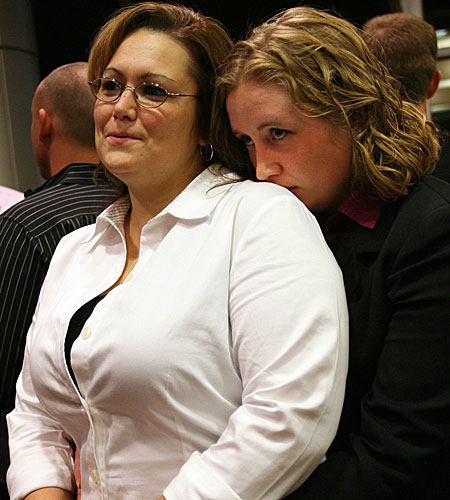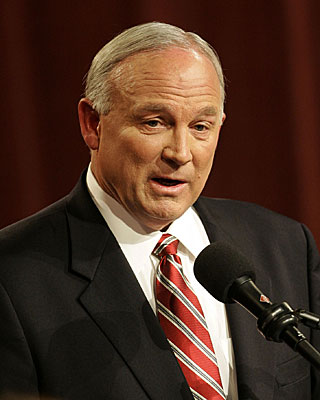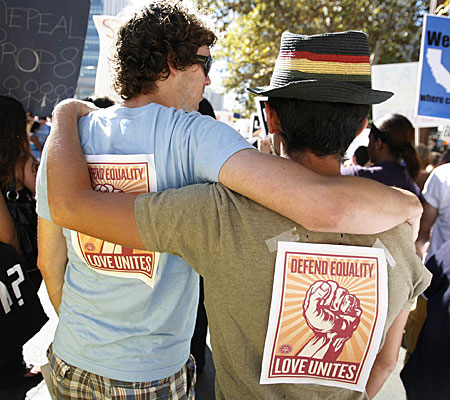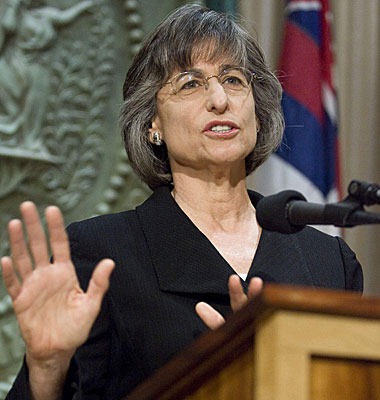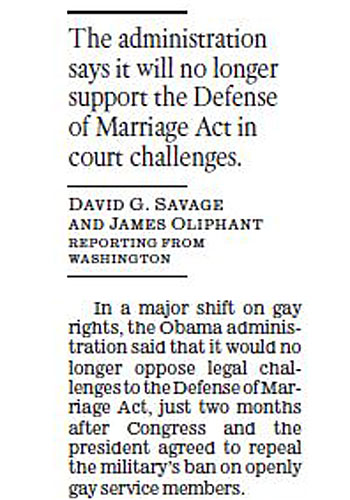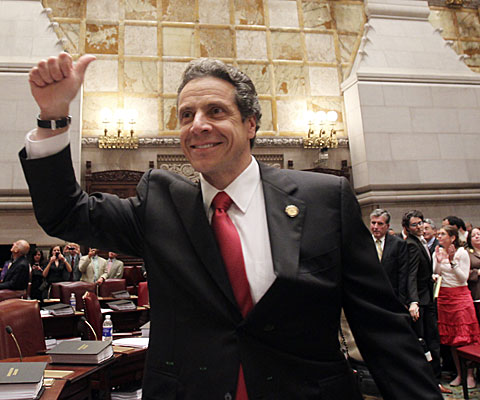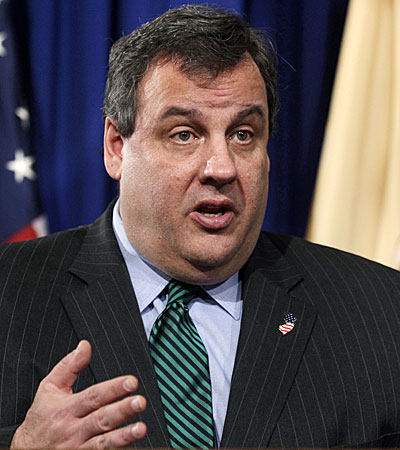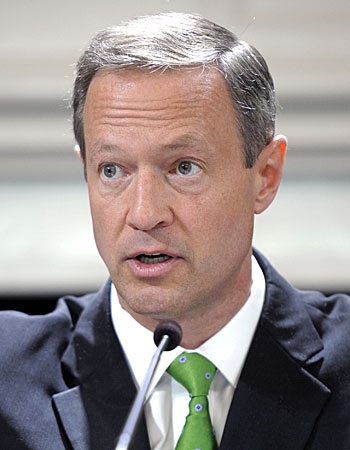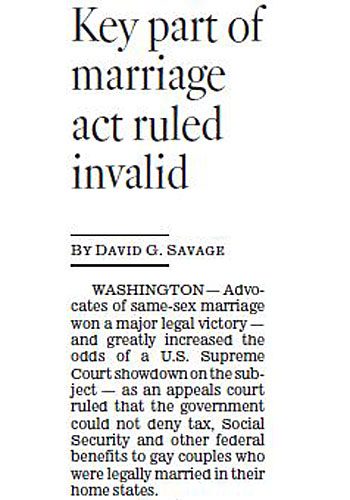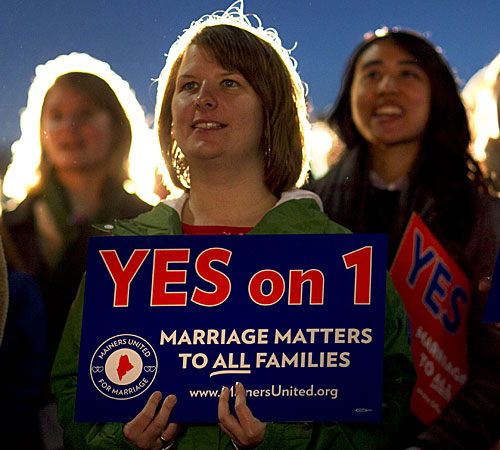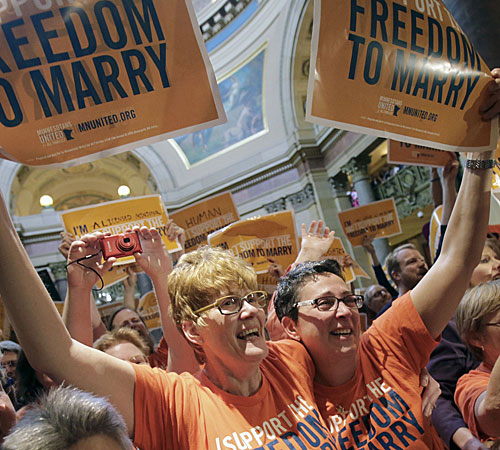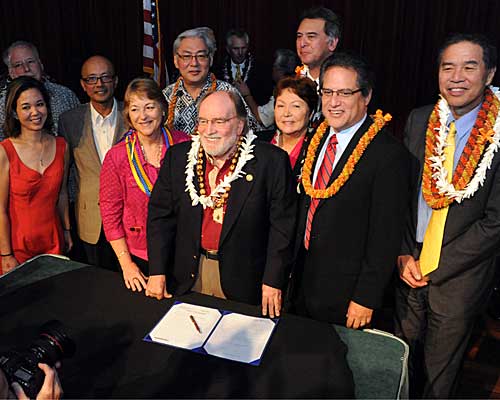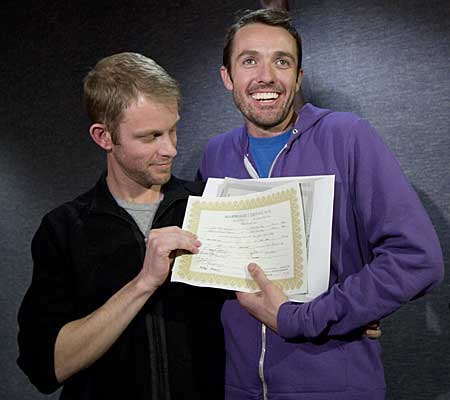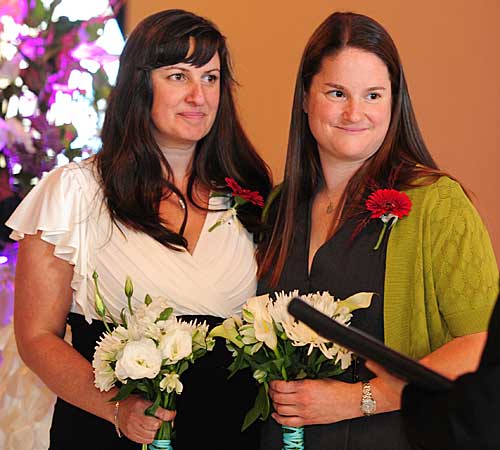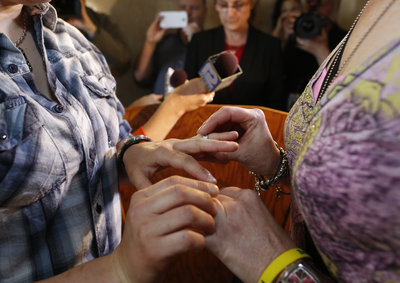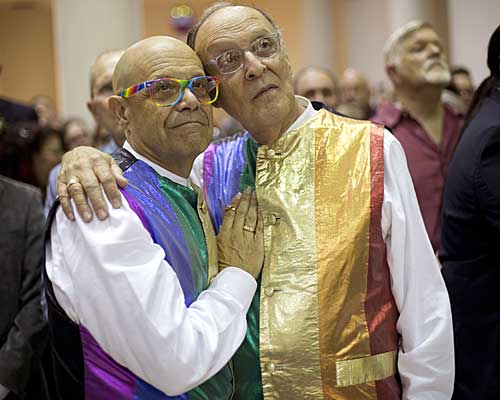Gay marriage
For more than a decade, the battle over same-sex marriage and other rights for gay couples has been hard fought in U.S. courts and legislatures and at the ballot box. Use this timeline to view milestones in the fight and how state laws have changed since 2000. On June 26, 2015, the U.S. Supreme Court ruled that same-sex couples have a constitutional right to marry nationwide.
Updated: June 26, 2015
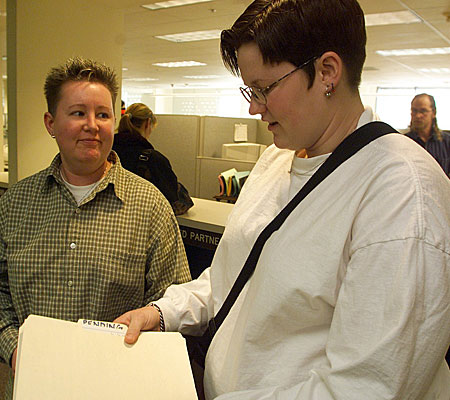
California starts registering domestic partners. While groundbreaking, the law affords same-sex couples only two benefits: hospital visitation rights and health insurance coverage for the dependents of government employees covered by CalPERS, the state retirement system.
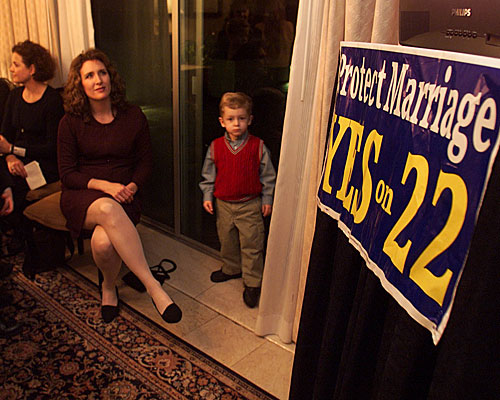
More than 61% of Californians approve a ballot measure declaring that marriage should remain reserved for couples of the opposite sex. Just 14 words long, Proposition 22 was one of the shortest initiatives ever placed on a California ballot. Yet it ignited an emotional $16-million campaign that set church against church, neighbor against neighbor and relative against relative.
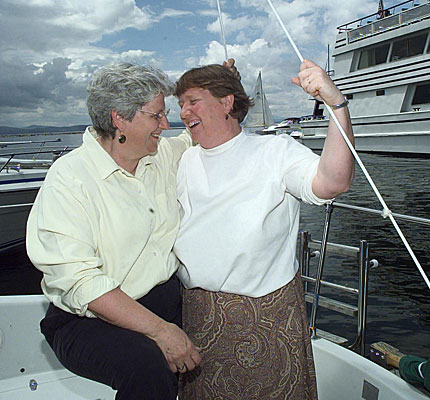
Vermont’s civil union law extends more than 300 benefits associated with marriage to gay and lesbian couples. Scores of couples from around the state and elsewhere descend on town halls to apply for a license giving them the same benefits heterosexual couples have — but not the word “marriage.”
Nearly 70% of Nevada voters approve amending the constitution to define marriage as a union between a man and a woman and to ban recognizing out-of-state same-sex marriages. State law already bans same-sex marriage. In Nevada, constitutional amendments must be passed twice before taking effect.
California Gov. Gray Davis signs a bill that substantially expands the rights granted domestic partners. The bill adds about a dozen legal benefits, including the right to make medical decisions for a partner in the hospital, use sick leave to care for an ill or incapacitated partner and relocate with a partner without losing unemployment benefits.
After nearly a decade of congressionally imposed barriers, officials in the nation’s capital celebrate efforts to provide benefits for the domestic partners of municipal employees. At hospitals in the city the certification will clear the way for partners to visit their loved ones over the objections of blood relatives.
Texas Gov. Rick Perry signs a law preventing his state from legally recognizing same-sex unions that are formed in other states. The new law denies same-sex couples who were joined in a marriage or civil union in another state the right to claim any legal protection or benefit granted to married people in Texas.
California Gov. Gray Davis signs a bill that gives state-registered domestic partners many of the legal rights and obligations of married couples in matters involving children, money and property. While stopping short of recognizing gay marriage, the law gives a partner the right to financial support and child custody after a partnership is dissolved and gives a survivor the right to collect his or her partner’s government benefits.
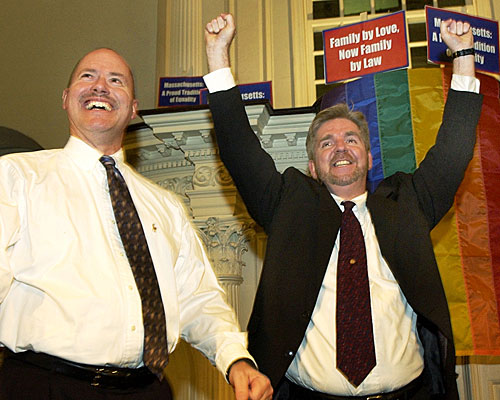
In the broadest ruling to date, Massachusetts’ highest court, in a 4-3 decision, says that the state’s constitution guarantees same-sex couples the right to wed. The ruling reformulates the conventional definition of civil marriage and gives the Legislature 180 days to come up with a plan to allow individuals of the same sex to wed.
President Bush reiterates his commitment to defend “the sanctity of marriage” and criticizes judges who have moved toward legalizing gay marriage. He suggests that a constitutional amendment might be required to stave off gay marriage but stops just short of supporting the idea.
Massachusetts’ highest court, at the request of state legislators, clarifies its stand on gay unions. The court rules that same-sex couples are entitled to marry beginning as early as May. The ruling makes Massachusetts the first state to grant the full rights of marriage to gay and lesbian couples.
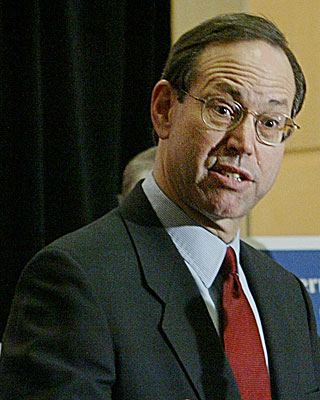
Ohio Gov. Bob Taft approves a far-reaching gay marriage ban, calling its adoption urgent since same-sex weddings could take place as early as the spring in Massachusetts. The bill also prohibits state employees from getting marital benefits for their unmarried partners, homosexual or heterosexual.

In a rare constitutional convention, the Massachusetts Legislature defeats a constitutional amendment, 104 to 94, that would have defined marriage as a union between one man and one woman. The amendment would have allowed for civil unions between same-sex couples. Legislators also narrowly reject a second amendment that would have banned same-sex marriage altogether. The proposals were designed to negate a Supreme Judicial Court ruling that allows gays and lesbians to marry beginning in May.
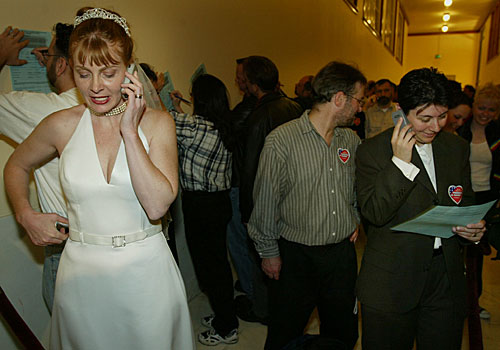
San Francisco Mayor Gavin Newsom instructs city officials to issue marriage licenses to same-sex couples, the first action of its kind in the nation. Dozens of couples are married as city offices stay open late to accommodate long lines.
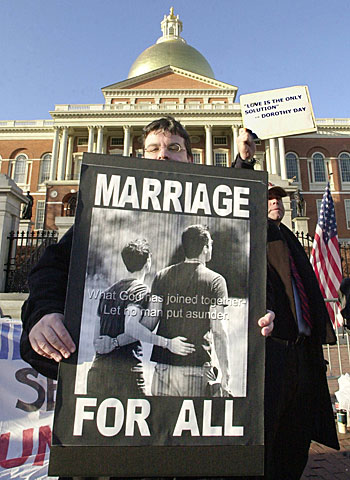
The Massachusetts Legislature votes down more amendments to define marriage as a union between a man and a woman. No constitutional amendments pass and the Legislature adjourns until March 11.
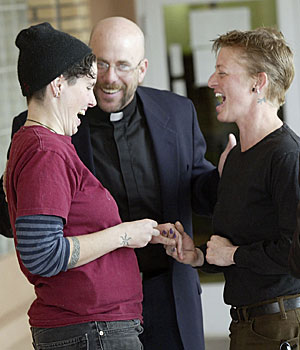
The Sandoval County clerk announces she will grant marriage licenses to same-sex couples, doling out 26. But New Mexico Atty. Gen. Patricia Madrid revokes them by issuing a late-afternoon opinion that the licenses are “invalid under state law.”
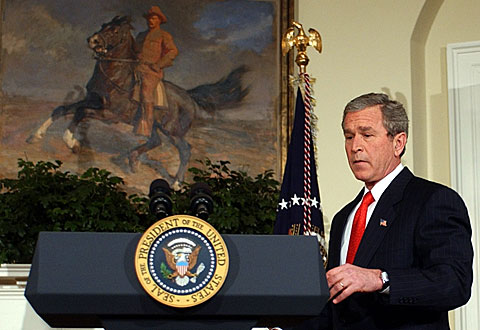
President Bush thrusts gay marriage into the presidential campaign by calling for a constitutional amendment to define marriage as a union between a man and a woman. He expresses alarm at the gay marriages conducted in San Francisco and the potential for same-sex weddings soon in Massachusetts.
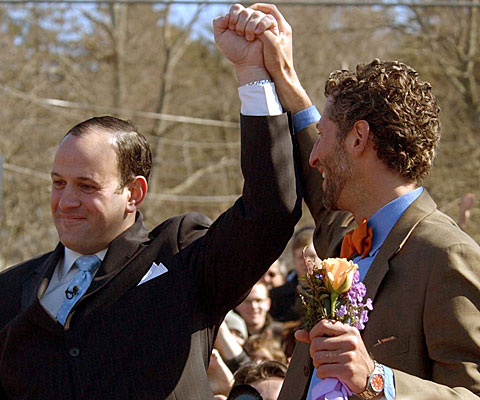
Twenty-one gay couples exchange wedding vows on the steps of the city building in New Paltz, a village 75 miles north of New York City. As a result, the state Health Department asks the attorney general to seek an injunction to halt the weddings. Mayor Jason West issues couples only a marriage certificate and not a marriage license.
Multnomah County Chairwoman Diane Linn orders clerks to issue marriage licenses to same-sex couples after a county attorney determines that restricting marriage to the union of a man and a woman is discrimination. Oregon Gov. Ted Kulongoski says he favors civil unions but questions the legality of the decision to issue marriage licenses in the county.
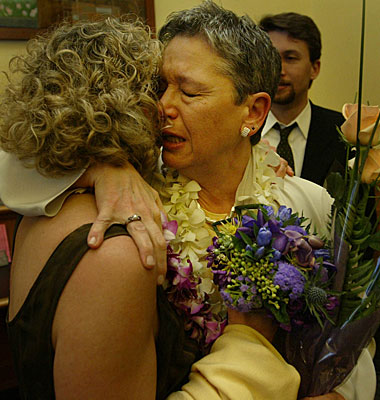
The California Supreme Court unanimously orders San Francisco to stop marrying gay couples and announces that it will rule on the legality of the city’s actions within the next few months. In four weeks, nearly 4,000 gay couples received licenses.
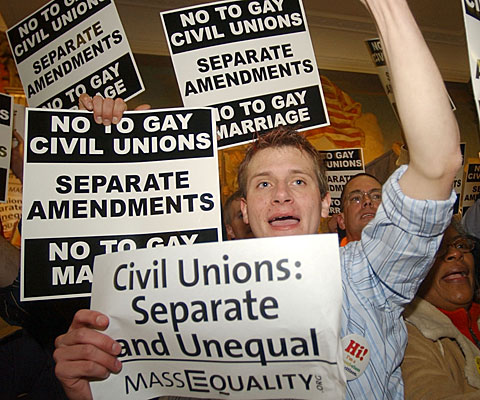
The Massachusetts Legislature approves a constitutional amendment, 105 to 92, to ban gay marriage and establish civil unions for same-sex couples. Before it can become law, however, it must again be approved by both chambers in 2005 and then voted on by the public as early as 2006. Gov. Mitt Romney seeks to stop the court-mandated May 17 start date for same-sex marriages.
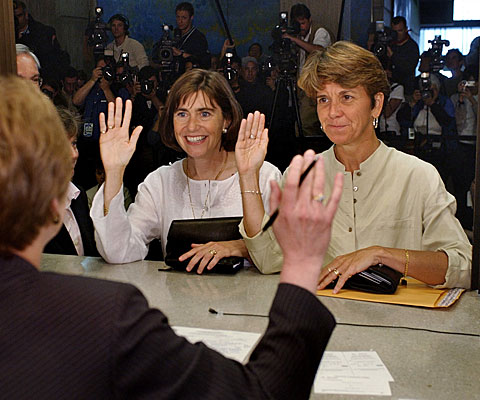
Massachusetts becomes the first state to legalize same-sex marriage, joining Belgium, Denmark, the Netherlands and three Canadian provinces as the only places in the world where gays and lesbians can marry.
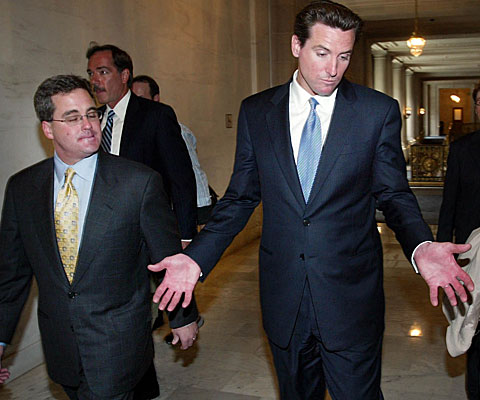
The California Supreme Court rules unanimously that San Francisco’s mayor overstepped his authority by issuing same-sex marriage licenses this spring. By a 5-2 vote, the court also declares the roughly 4,000 marriages of gay and lesbian couples that had been sanctioned by the city “void from their inception and a legal nullity.”
A San Francisco judge hears arguments on same-sex marriage. At the heart of the consolidated lawsuits — brought by the city of San Francisco and a dozen gay and lesbian couples — is the contention that current law defining marriage as “between a man and a woman” violates the state Constitution by denying homosexuals the “fundamental right” to marry the person of their choosing.
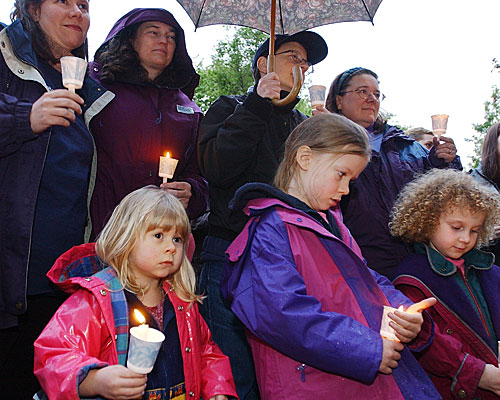
The Oregon Supreme Court voids nearly 3,000 marriage licenses issued by Multnomah County to gay and lesbian couples in March and April 2004. The court noted that Oregonians had passed a constitutional amendment defining marriage as a heterosexual institution in November 2004.
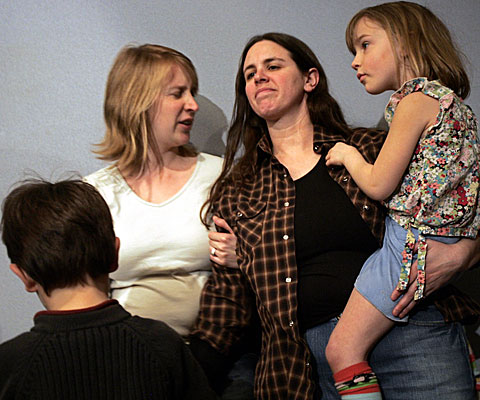
The Supreme Judicial Court rules that city and town clerks may not issue marriage licenses to same-sex couples from out of state. The court upholds a 1913 law that bars couples from out of state from marrying in Massachusetts if their unions would not be recognized in their home states.
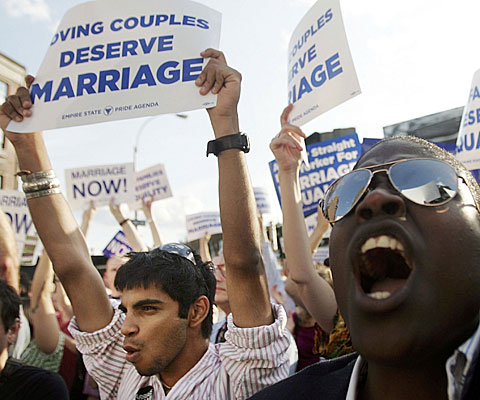
The New York Court of Appeals rules 4 to 2 against more than 40 same-sex couples challenging the state’s decades-old statute limiting marriage to opposite-sex couples.
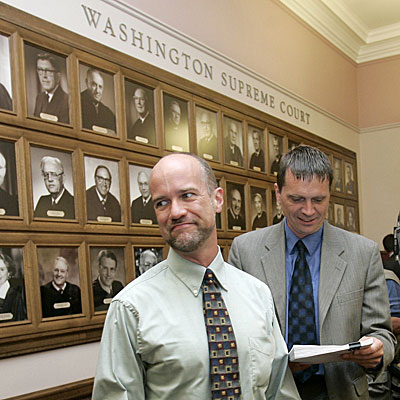
Washington’s Supreme Court rules 5 to 4 that there is no constitutional right for people of the same sex to marry. The decision upholds the Legislature’s 1998 Defense of Marriage Act.
The state Supreme Court reinstates Georgia’s constitutional ban on gay marriage, ruling unanimously that the ban did not violate the state’s single-subject rule for ballot measures. Attorneys for the plaintiffs had argued that ballot language appeared to ban gay marriages as well as gay civil unions.
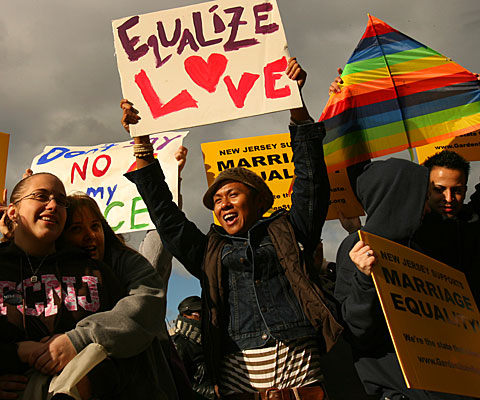
New Jersey’s Supreme Court rules that the state constitution guarantees gay couples all the rights and benefits of marriage, except one: the word “marriage.” The 4-3 decision gives the Legislature six months to act.
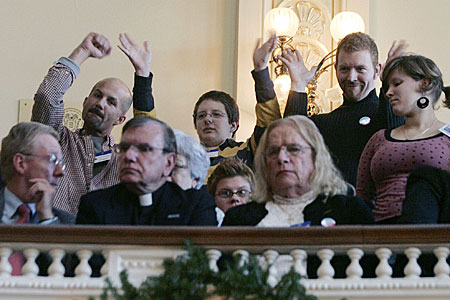
New Jersey becomes the third state to allow civil unions. In October the state’s Supreme Court had ruled that gay couples are constitutionally guaranteed the benefits of marriage — but left it to legislators whether to call these unions “marriage.”
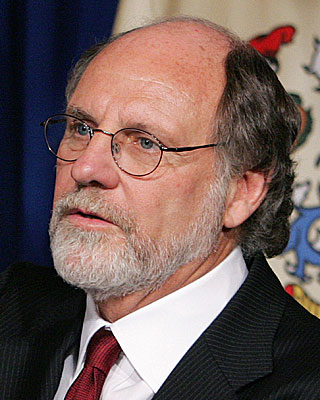
New Jersey Gov. Jon J. Corzine signs a civil union law making his state the third in the nation to allow such unions. In October the state’s Supreme Court had ruled that gay couples are constitutionally guaranteed the benefits of marriage — but left it to legislators whether to call these unions “marriage.”
New Jersey becomes third state to offer civil unions
New Jersey begins civil unions, offering the legal benefits but not the title of marriage. Civil unions were granted automatically to the hundreds of same-sex New Jersey couples who had been joined in civil unions or married in other states or nations.
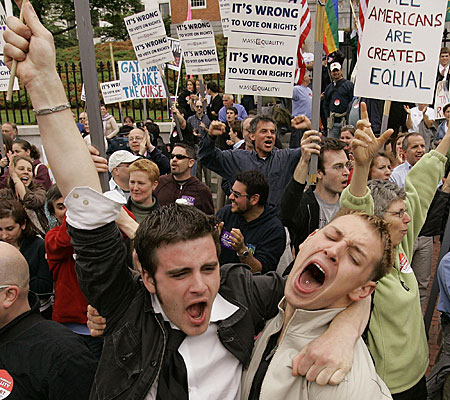
In a victory for supporters of gay marriage, Massachusetts lawmakers block a measure to let voters decide whether a constitutional amendment should ban same-sex marriage. Conservative groups had tried for four years to override a historic 2003 court decision that legalized gay marriage in the state.
A county judge in Iowa strikes down the state’s decade-old gay marriage ban as unconstitutional and orders local officials to process marriage licenses for six gay couples. Less than two hours after it was publicized, two Des Moines men apply for a license, the first time the county accepted a same-sex marriage application.
Maryland’s highest court upholds a 34-year-old state law banning same-sex marriage, rejecting an attempt by gays and lesbians to win the right to marry. In reversing a lower court’s decision, the Court of Appeals rules 4 to 3 that limiting marriage to a man and a woman does not discriminate against gay couples.
San Diego mayor reverses opposition to gay marriage
An emotional Mayor Jerry Sanders abruptly reverses his public opposition to same-sex marriage. Sanders, tears welling and voice breaking, says he realizes that he can not tell his daughter Lisa, who is gay, that her relationship with a partner is not as important as that of a straight couple.
The Rhode Island Supreme Court, in a 3-2 decision, rules that a lesbian couple who had married in Massachusetts could not be divorced in Rhode Island because the state defines marriage as the union between a man and a woman. The state’s attorney general had issued a legal opinion in 2007 that Massachusetts’ same-sex marriages would be recognized, but conceded that his opinion did not have the force of law.
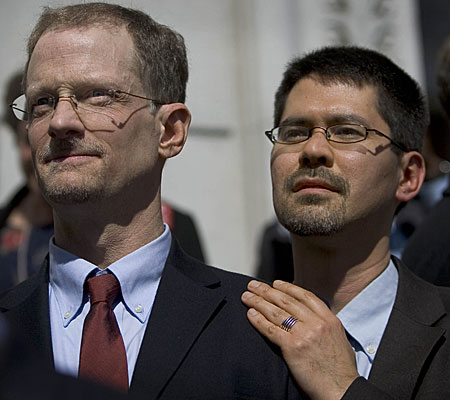
The California Supreme Court considers four lawsuits brought by same-sex couples after San Francisco issued marriage licenses in 2004. Three of the court’s seven justices indicate they will uphold state law defining marriage as between a man and a woman. Ruling is expected within 90 days.
California Supreme Court strikes down state ban on same-sex marriage in a 4-3 ruling
The California Supreme Court rules that the state constitution protects a fundamental “right to marry” that extends equally to same-sex couples. The three dissenting justices argue that it is up to the electorate or the Legislature to decide whether gays should marry.
California secretary of state rules an initiative barring gay marriage qualifies for Nov. 4 ballot
More than 1 million signatures are submitted for a ballot measure that would amend the state constitution to define marriage as a union “between a man and a woman” and undo the California Supreme Court ruling allowing gay marriages.
County registrars and clerks in Los Angeles, San Francisco, Alameda, Sonoma and Yolo counties keep offices open to allow at least two dozen same-sex couples the distinction of being among the first to wed. Seven Southern California Roman Catholic bishops, including L.A. Cardinal Roger Mahony, reaffirm their opposition to same-sex marriage.
The California Supreme Court rejects arguments that Proposition 8 — which if passed by voters would amend the state Constitution to ban gay marriage — is an illegal constitutional revision. Justices also reject the argument that voters had been misled when they signed petitions to put it on the ballot.
The Connecticut Supreme Court gives gay and lesbian couples the right to marry, ruling that civil unions relegate them to a “separate” and “inferior status” that falls short of equality. Connecticut now joins Massachusetts and California in authorizing marriage for gay and lesbian couples. In all three cases, the issue was decided in a 4-3 ruling by the state high court.
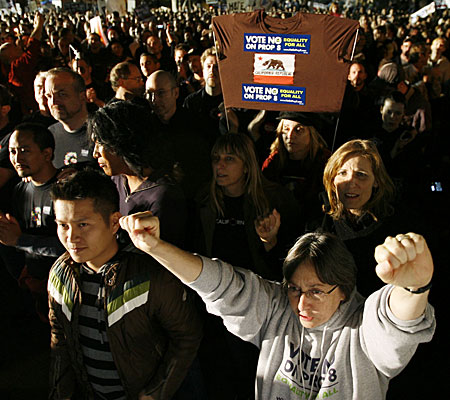
California voters pass Proposition 8 — which amends the state Constitution to ban gay marriage — with about 52% of the vote. A 2000 ballot initiative banning gay marriage, Proposition 22, had passed with 61% of the vote but was later struck down by the state’s high court.
Wyoming legislators defeat an attempt to define marriage in the state constitution as a union between a man and a woman. The “Defense of Marriage” resolution fails 35 to 25. State law only recognizes heterosexual marriage but requires the state to recognize marriages performed elsewhere.
Saying they suffered injustices under the Defense of Marriage Act, a dozen legally married same-sex spouses file suit against the federal government, alleging that the 1996 law deprives them of a range of benefits accorded other couples. Legal analysts predict the suit, filed in Boston, will take years before it makes its way through the federal court system.
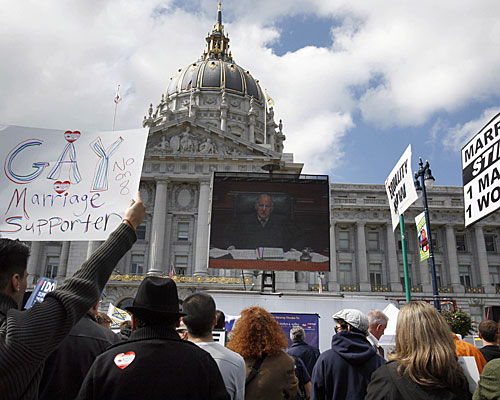
The California Supreme Court strongly indicates it will rule that Proposition 8 validly abolished the right for gays to marry but will allow same-sex couples who wed before the November election to remain legally married.
The state House votes to make New Hampshire the third state to allow gay couples to marry, in addition to Massachusetts and Connecticut. The bill, passed 186 to 179, now goes to the Senate, where its future is uncertain. Gov. John Lynch opposes gay marriage but has not said specifically that he would veto it.
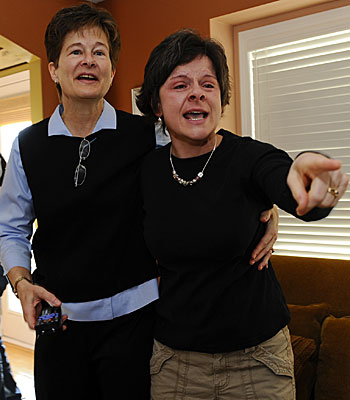
The Iowa Supreme Court, citing California’s historic marriage decision, overturns a ban on same-sex marriage in a ruling that emphasizes the need for courts to protect minorities even when public sentiment is against them.
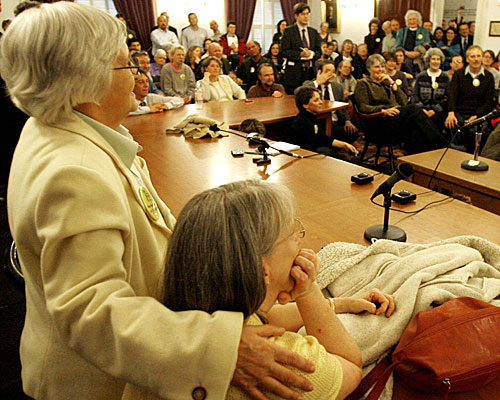
The Vermont Legislature votes to permit same-sex couples to marry. The state is the first in the union to legalize gay marriage through a vote of lawmakers rather than a court action.
Colorado Gov. Bill Ritter signs the Designated Beneficiary Agreement Act, which extends inheritance, hospital visitation and other rights to gay couples. The law is scheduled to take effect July 1, 2009. In 2006, voters in the state passed a constitutional amendment banning gay marriage.
New York Gov. David Paterson plans to introduce legislation to legalize same-sex marriage, reviving a bill that died in 2007. Paterson says “there is clearly a problem” when gays and lesbians in civil unions are denied civil protections such as healthcare and pension rights because they’re not married.
Washington, D.C., to recognize gay marriage
The city council in the nation’s capital votes 12 to 1 to recognize same-sex marriages from states that approve them, a first step to allowing gay marriages there. Congress has final say over the city’s laws and has 30 days to review the bill.
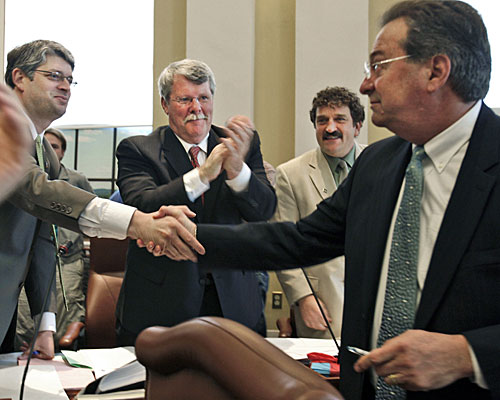
Maine becomes the fifth state to legalize gay marriage, which is scheduled to take effect in mid-September. Within hours of the governor’s signing of the bill, opponents to gay marriage begin working to gather signatures for a so-called People’s Veto.
Washington Gov. Chris Gregoire signs legislation giving registered same-sex domestic partners all the rights and benefits that the state now offers married couples. The law is scheduled to take effect July 26. Opponents, however, are trying to overturn the law at the ballot box in November. If they can gather 120,577 signatures by July 25 the new law will be suspended until the November vote.
The California Supreme Court upholds Proposition 8’s ban on same-sex marriage but rules that gay couples who wed before the election will continue to be married under state law. The decision virtually ensures another fight at the ballot box over marriage rights for gays. Gay rights activists say they may ask voters to repeal the marriage ban as early as next year, and opponents have pledged to fight any such effort. Proposition 8 passed with 52% of the vote.
Gay marriage battle resumes as Prop. 8 is challenged in court
Opening a new front in California’s gay marriage battle, prominent attorneys working for a project of the American Foundation for Equal Rights announce they will file suit in federal court. The suit calls for an injunction against Proposition 8 and the immediate reinstatement of marriage rights for same-sex couples.
Gov. John Lynch signs a bill legalizing gay marriage in his state, the same day the measure passed the New Hampshire’s legislative houses. Lynch had promised a veto if the law didn’t clearly spell out that churches and religious groups would not be required to officiate at gay marriages or provide other services. The law is scheduled to take effect Jan. 1, 2010. Massachusetts, Connecticut, Maine, Vermont and Iowa already allow gay marriage.
Implementation of Washington’s 2009 domestic partnership bill on hold
Implementation of the domestic partnership bill, which was scheduled to take effect July 26, is put on hold. Sponsors of Referendum 71, which would block the law from going into effect, have filed their petition signatures with the state’s Election Division. If there are enough valid signatures (120,577), the question of whether or not to repeal the law will go on the November ballot. If there are not enough signatures the law becomes effective immediately.
Opponents of same-sex marriage launch a campaign to renew a ban on gay marriage in Iowa. The National Organization for Marriage, which was active in getting Proposition 8 approved by voters in California, sent out an appeal for donations to run advertisements on behalf of political candidates who oppose same-sex marriage. It said the first ad would support Republican Stephen Burgmeier, who supports putting the issue of same-sex marriage to a vote in the Hawkeye State. He is up for election in less than two weeks.
Voters in Washington approve Referendum 71 by 52%. It asked voters to reconfirm the legislature’s recent expansion of domestic partnership rights. Dubbed the “everything but marriage” law, it expanded previous domestic partnership laws to include issues like adoption, child support, pensions and other public-employee benefits.
Maine’s gay marriage law is rejected
Voters reject the state’s gay marriage law. The law, originally scheduled to take effect in mid-September, was never enacted. It was put on hold after opponents launched a petition drive to place a measure to repeal gay marriage on the November ballot.
Hawaii’s House of Representatives approves a measure allowing same-sex civil unions. The House voted 31 to 20 in favor of the legislation, which would grant same-sex couples the same rights and benefits provided to married couples. The Senate passed the measure in January. Gov. Linda Lingle has not said if she will sign the bill into law.
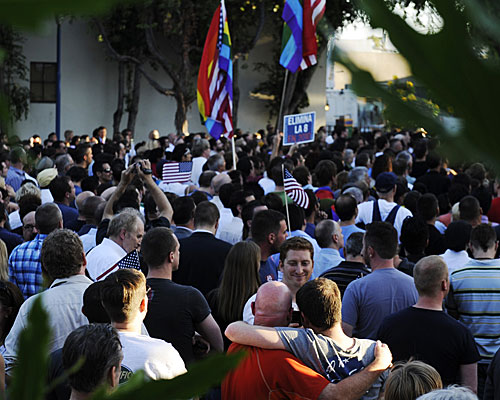
A federal judge in San Francisco rules that gays and lesbians have a constitutional right to marry, striking down Proposition 8, the voter approved ballot measure that banned same-sex unions. U.S. District Chief Judge Vaughn R. Walker said Proposition 8, passed by voters in November 2008, violates the federal constitutional rights of gays and lesbians to marry the partners of their choice. His ruling is expected to be appealed to the U.S. 9th Circuit Court of Appeals and then up to the U.S. Supreme Court.
9th Circuit judges decide to hear arguments in December but put marriages on hold for now
A federal appeals court puts same-sex marriage in California on hold at least until December. The panel’s decision gave no explanation for staying Judge Vaughn R. Walker’s order directing the state to once again allow same-sex couples to marry. The panel said the court would hear the Proposition 8 challenge on an expedited basis and hold arguments the week of Dec. 6. Another panel of three judges is expected to rule on the appeal.
9th Circuit judges explore narrow routes to reinstate gay marriage
Federal appeals court judges seem headed toward a decision that could reinstate same-sex marriages in California while avoiding a ruling of national sweep that would invite U.S. Supreme Court action. The judges explore at least two routes that could achieve that goal.
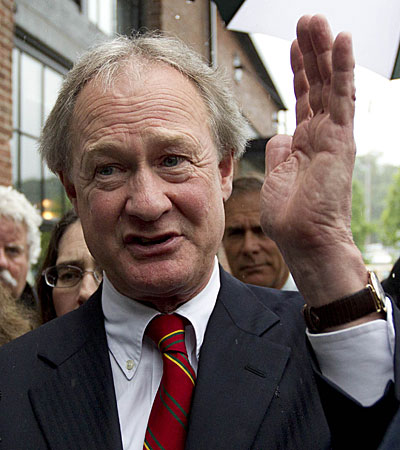
Rhode Island Gov. Lincoln D. Chafee signs bill allowing gay couples to enter civil unions. He calls the bill a step toward full marriage rights, even as he expresses reservations about the measure. He says the bill fails to give gay couples the full rights given to heterosexual couples and that he has concerns about the exemptions given to religious groups.
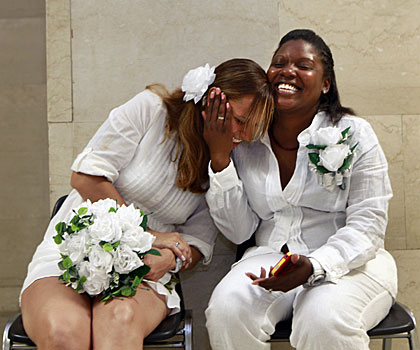
New York’s law allowing same-sex marriage goes into effect. New York is the sixth and most populous state to permit same-sex marriage.
The California Supreme Court appears ready to rule that the backers of Proposition 8 and other ballot measures have the right to defend them in court, a stance that would give opponents of same-sex marriage the chance to champion the initiative all the way to the U.S. Supreme Court.
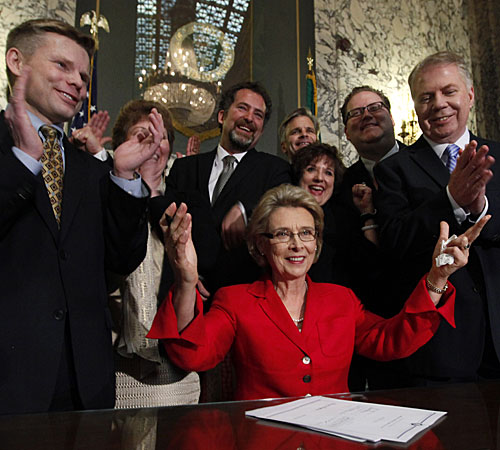
Washington Gov. Chris Gregoire signs legislation giving same-sex couples the same right to a marriage license as anyone else. The law is set to go into effect June 7, but opponents plan to challenge the bill.
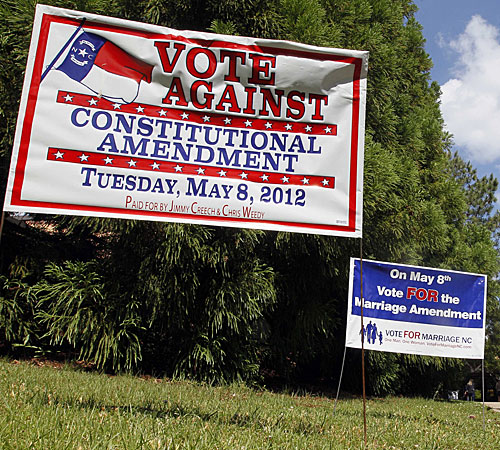
Voters in North Carolina pass an amendment to the state constitution that defines marriage as the legal union of a man and a woman.
Voters in North Carolina approve Amendment One, a fiercely debated and highly restrictive amendment to the state constitution that defines marriage as the legal union of a man and a woman. The amendment not only outlaws same-sex marriage — already illegal in the state — but bans civil unions and domestic partnerships for gay or straight couples.
The U.S. 9th Circuit Court of Appeals votes not to review a three-judge panel’s decision to overturn the voter-approved 2008 state constitutional amendment. The legal battle is now headed to the U.S. Supreme Court, the final chapter in four years of litigation over the constitutionality of Proposition 8’s ban on gay marriage.
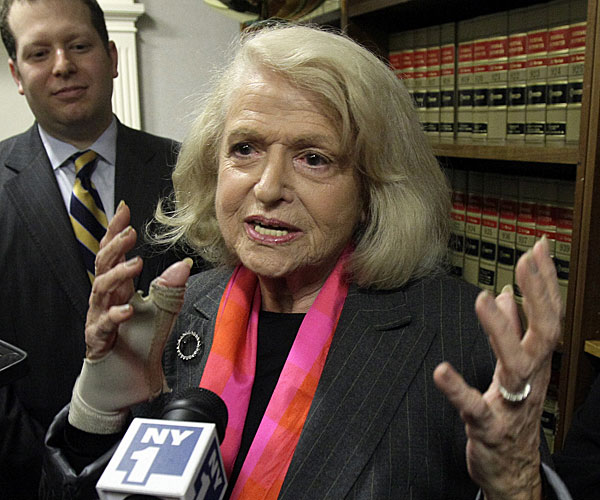
The U.S. 2nd Circuit Court of Appeals in New York strikes down part of the Defense of Marriage Act and becomes the first to say that gays and lesbians are a minority group deserving of special protection from discrimination under the Constitution.
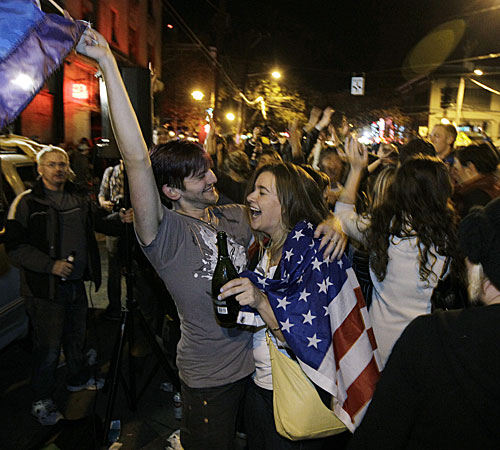
Washington joins Maine and Maryland in passing a same-sex marriage measure on the ballot. Same-sex couples couple can apply for marriage licenses in early December.
The Obama administration endorses a constitutional right to marry for gays and lesbians, urging the Supreme Court to strike down California’s voter-passed law barring same-sex marriage as well as laws in at least the seven other states that already provide civil unions. “Tradition, no matter how long established, cannot by itself justify a discriminatory law,” the administration said in a brief filed with the high court. “Prejudice may not be the basis for differential treatment under the law.”
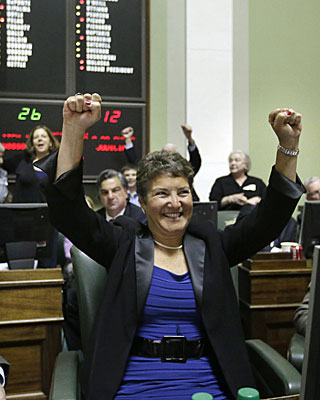
The Rhode Island Senate passes a bill that could clear the way for same-sex weddings to begin this summer. The bill passed 26 to 12 after about 90 minutes of debate and is due to take effect Aug. 1, assuming nothing blocks what is seen as a routine vote in the House and the signature of Gov. Lincoln Chafee.
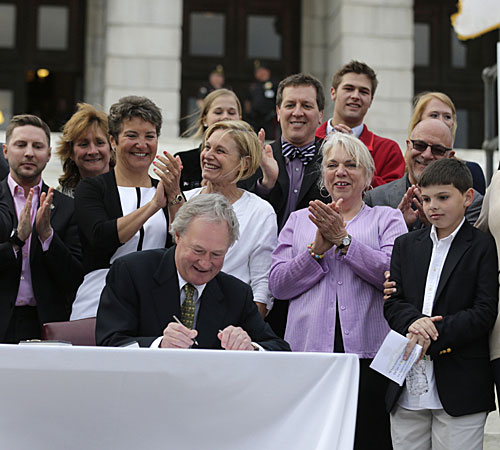
Rhode Island became the nation’s 10th state to allow gay and lesbian couples to wed. Gov. Lincoln Chafee, an independent, signs the bill into law following a final 56-15 vote in the House. The first weddings will take place Aug. 1, when the law takes effect.
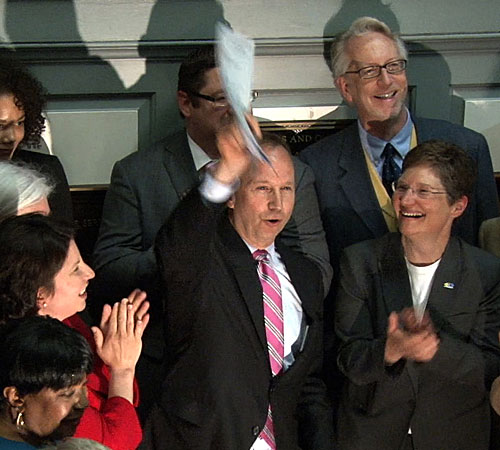
The Delaware Senate approves a bill legalizing gay marriage, sending it to Gov. Jack Markell, who signs the measure into law. The law takes effect July 1.
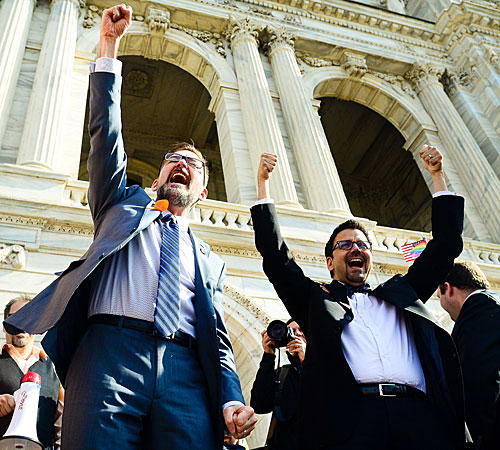
Four days after the Minnesota House approved legislation to make same-sex marriage legal, the Senate OKs the measure in a 37-30 vote.
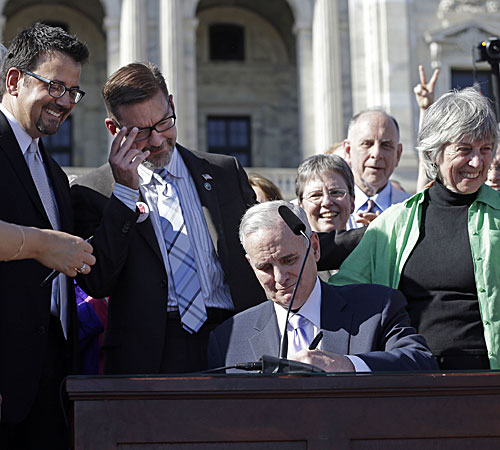
Minnesota Gov. Mark Dayton signs a bill making gay marriage legal in Minnesota. When the law takes effect Aug. 1, Minnesota will become the 12th state to allow same-sex marriage.
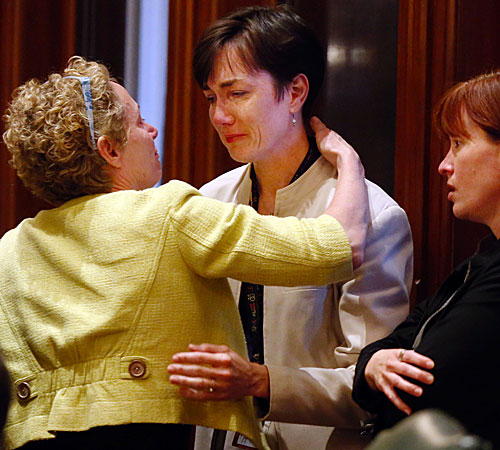
With the state poised to become the 13th to approve same-sex marriage, supporters in the Illinois House fail to muster enough support to call the bill for a vote.
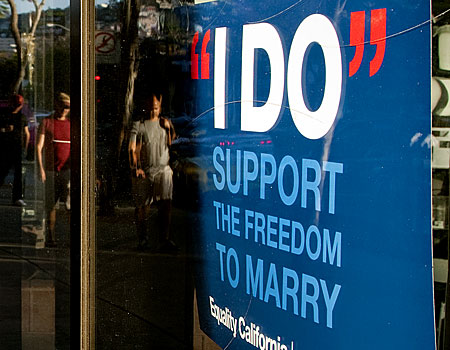
The U.S. Supreme Court clears the way for same-sex marriages to resume in California as the justices, in a procedural ruling, turn away the defenders of Proposition 8.
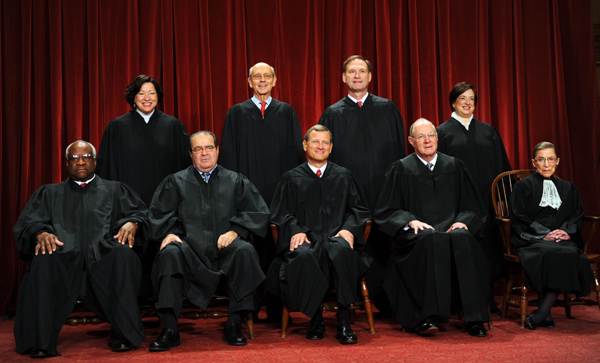
The U.S. Supreme Court strikes down a key part of the federal Defense of Marriage Act, ruling that legally married same-sex couples are entitled to the same rights as all other married couples.
The court also opens the door for same-sex marriages to resume in California by turning away the defenders of the state’s Proposition 8.
The U.S. 9th Circuit Court of Appeals clears the way for gay marriages to resume in California. The court lifts its stay on an injunction which had ordered state officials to stop enforcing Proposition 8. With the court’s action, counties can now begin issuing same-sex marriage licenses.
The California Department of Public Health tells all county clerks and recorders to begin issuing marriage licenses to same-sex couples “effective immediately.”
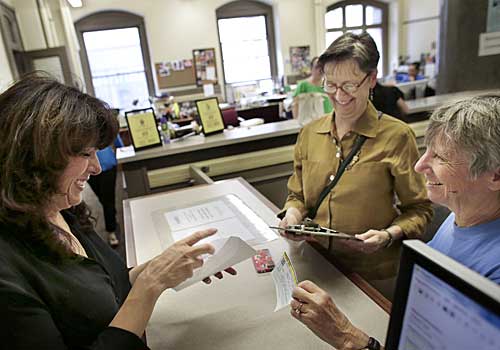
For the first time local officials in Rhode Island issue marriage licenses to gay couples.

Cathy ten Broeke and Margaret Miles are the first couple legally wed in Minnesota. Minneapolis Mayor R.T. Rybak marries the couple on the marble steps of the City Hall Rotunda.
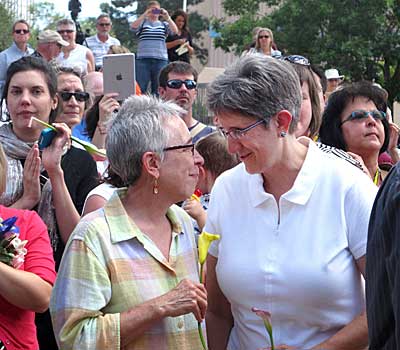
Following an order by New Mexico District Judge Alan M. Malott, the Bernalillo County Clerk’s office begins issuing marriage licenses to same-sex couples.
The order, which affects the state’s largest city, Albuquerque, comes after both Santa Fe County and Dona Ana County began issuing marriage licenses last week.
New Mexico state laws do not explicitly allow or forbid same-sex marriage, although they had been interpreted as restricting the practice.
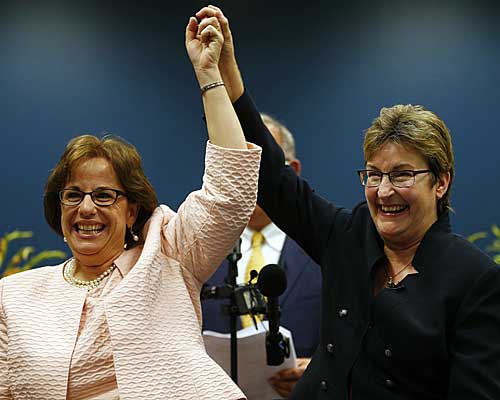
Beth Asaro and Joanne Schailey become among the first gay couples to wed in New Jersey, the 14th state to permit same-sex marriage.
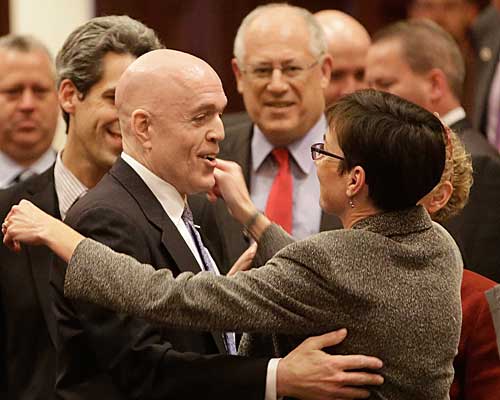
Both chambers of the Illinois Legislature approve a measure that legalizes gay marriage. Gov. Pat Quinn is expected to sign the bill into law.
Under the measure, gay couples could begin getting married in Illinois in June.
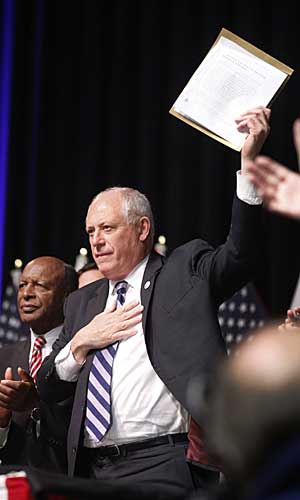
Illinois Gov. Pat Quinn signs legislation legalizing same-sex marriage. When the law takes effect June 1, Illinois will become the 16th state to allow gay marriage.

New Mexico’s highest court unanimously rules it is unconstitutional to deny a marriage license to same-sex couples, making it the 17th state to legalize gay weddings.
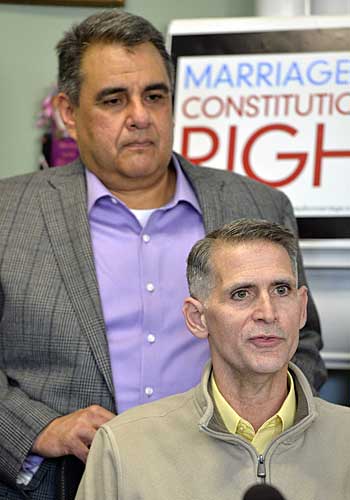
A federal judge strikes down part of Kentucky’s same-sex marriage ban. U.S. District Judge John G. Heyburn orders Kentucky to recognize same-sex marriages legally performed in other states and opens the door wide for activists to strike down Kentucky’s ban entirely.
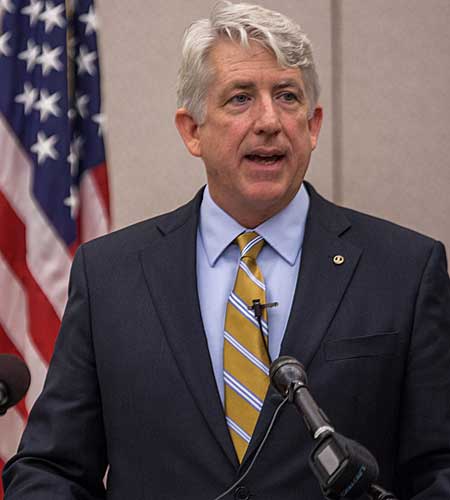
A federal judge in Virginia invalidates the state’s ban on same-sex marriage but stays her ruling pending appeal. U.S. District Judge Arenda L. Wright Allen in Norfolk strikes down the state’s ban as unconstitutional under the equal protection clause of the 14th Amendment.
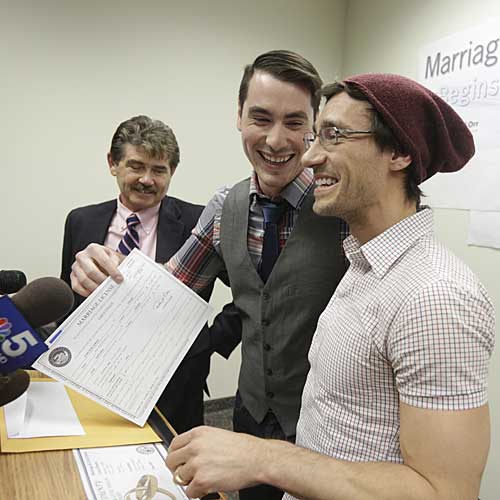
U.S. District Judge Sharon Johnson Coleman rules that same-sex couples in Cook County can apply for marriage licenses. For the moment, Coleman’s ruling applies only to Cook County.
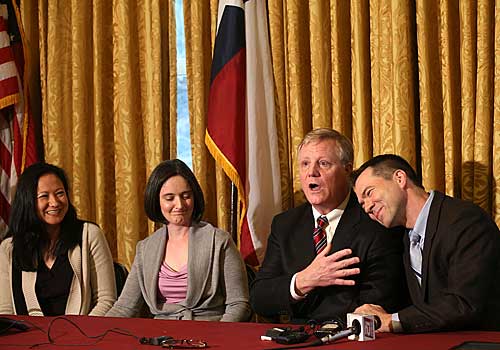
U.S. District Judge Orlando Garcia in San Antonio overturns the state’s ban on same-sex marriage but stays his ruling pending appeals. Garcia writes that the prohibition is unconstitutional and stigmatizes gay couples.
A federal judge strikes down Michigan’s gay marriage ban, and four counties open their offices the next day to issue licenses. But late on March 22, the U.S. 6th Circuit Court of Appeals in Cincinnati orders a temporary halt to the marriage ceremonies by issuing an emergency stay. A few days later, the appeals court makes the stay permanent, pending a review of the case.
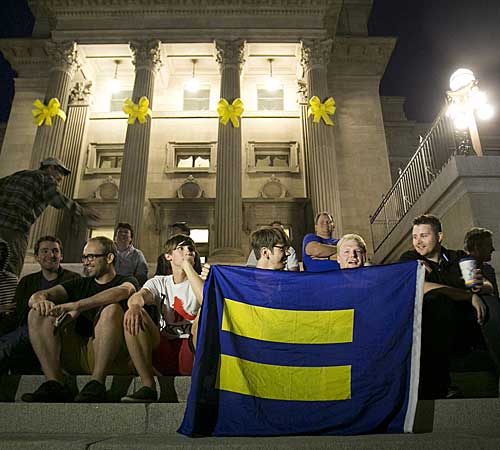
Idaho’s same-sex marriage ban is declared unconstitutional. “Marriage is a fundamental right of all citizens, which neither tradition nor the majority may deny,” a federal judge wrote in her opinion. Two days later, the U.S. 9th Circuit Court of Appeals puts a temporary hold on the ruling, preventing same-sex marriages from beginning.
The Arkansas Supreme Court halts the issuance of marriage licenses to same-sex couples by granting a request to stay a lower court ruling that had invalidated laws against gay marriage. Hundreds of gays and lesbians had married since a ruling a week earlier that the state’s ban on gay marriage was unconstitutional.
A federal judge in Oregon throws out the state’s same-sex marriage ban, saying it is unconstitutional and discriminatory, placing gays and lesbians “at a disadvantage … without any rationally related government purpose.” Shortly after the ruling, proponents of same-sex marriage said that marriage licenses were issued in Multnomah County, home to Portland.
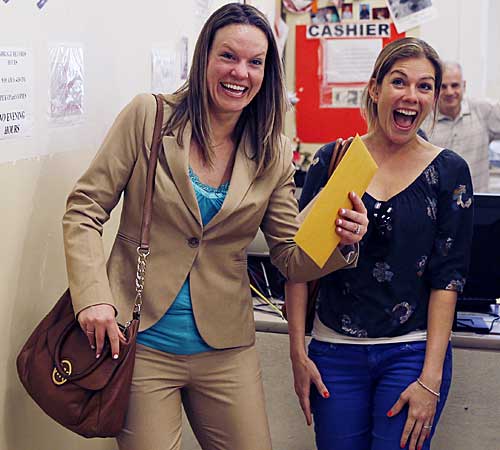
U.S. District Judge John Jones III, sitting in Harrisburg, Pa., rules that the state’s 1996 ban on same-sex marriage is unconstitutional. The action means that all nine Northeast states have legalized same-sex marriage.
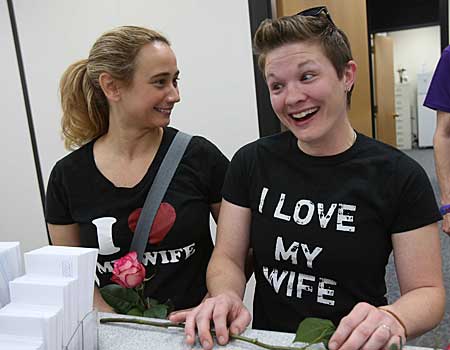
Legislation that legalized same-sex marriage goes into effect. Illinois is one of 19 states to allow gay marriage.
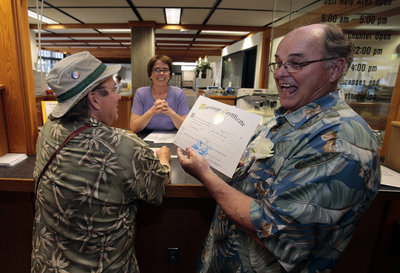
Same-sex marriage in Oregon wins another skirmish as the U.S. Supreme Court refuses to stop gay men and lesbians from marrying as requested by the National Organization for Marriage.
A federal judge strikes down Indiana’s ban on gay marriage, saying it violates the U.S. Constitution’s equal-protection clause.
U.S. District Judge Richard Young’s ruling does not have a stay on it, and couples begin marrying immediately.
The Indiana attorney general’s office says it will ask for a stay while it appeals the ruling.
The Denver-based U.S. 10th Circuit Court of Appeals rules that states, in this case Utah, can’t bar gay marriage — the first such ruling from a federal appeals court.
In a split decision, two judges on the panel strongly back a constitutional right to same-sex marriage, while the other concurred in part but mainly dissented. The ruling, which upheld a lower-court decision, was stayed to allow time for Utah to appeal the case.
Utah officials say they will fight all the way to the Supreme Court to uphold the state’s ban on gay marriage.
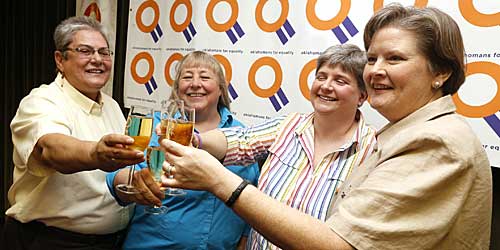
A three-judge panel of the 10th Circuit Court of Appeals strikes down Oklahoma’s ban on same-sex marriage. The panel’s decision is immediately put on hold.
The U.S. Supreme Court turns down all the pending state appeals in the gay-marriage cases, leaving intact rulings in five more states that said gays and lesbians have a constitutional right to marry.
This action means that same-sex marriage is legal now in Utah, Oklahoma, Virgina, Indiana and Wisconsin.
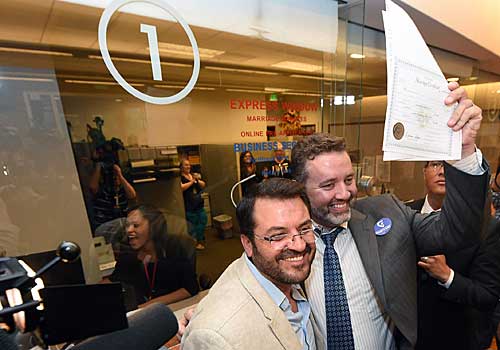
Nevada begins issuing marriage licenses after the U.S. 9th Circuit Court of Appeals declares same-sex marriages legal in the state.
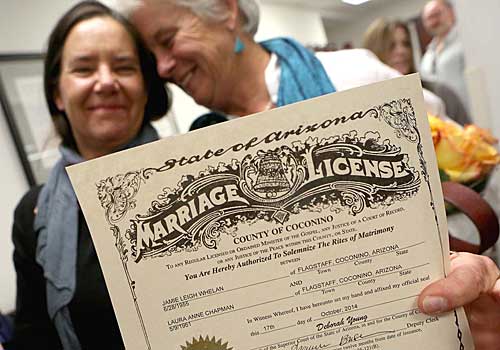
U.S. District Court Judge John Sedwick strikes down Arizona’s gay marriage ban and declines to issue a stay of his ruling. The state’s attorney general directs clerks to start issuing marriage licenses to same-sex couples.
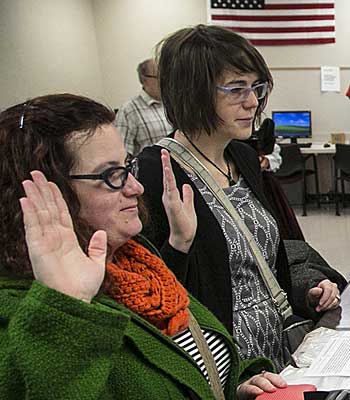
The U.S. Supreme Court ends a Nov. 10 stay that temporarily prevented Kansas from issuing marriage licenses to same-sex couples. The state insists the ruling applies to only two counties, Douglas and Sedgwick.
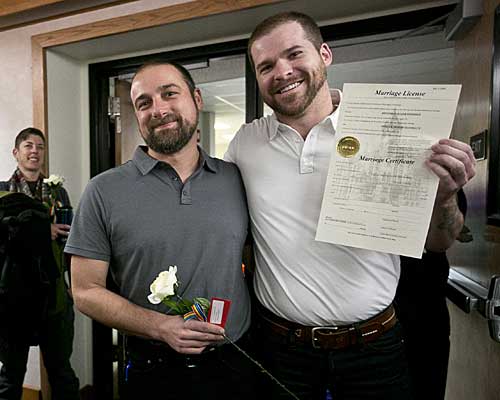
A federal judge strikes down Montana’s ban on same-sex marriage. U.S. District Judge Brian Morris rules that the ban violates the equal protection clause in the 14th Amendment. The court’s ruling is effective immediately.
U.S. District Judge Carlton Reeves strikes down Mississippi’s gay marriage ban. He immediately puts his ruling on hold. Reeves wrote, “The 14th Amendment operates to remove the blinders of inequality from our eyes. Though we cherish our traditional values, they must give way to constitutional wisdom.”
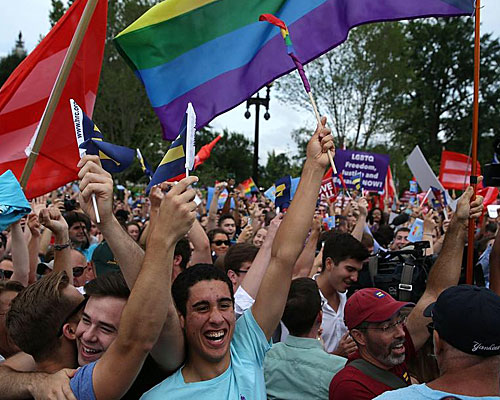
The U.S. Supreme Court rules that same-sex couples have a constitutional right to marriage.
Read the full U.S. Supreme Court decision.
Sources: Times research
Credits: Megan Garvey, Molly Hennessy-Fiske, Rong-Gong Lin II, Brady MacDonald, Mark McGonigle, Maloy Moore, Anthony Pesce, Ken Schwencke, James Wagner, TimelineSetter

